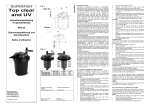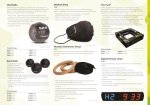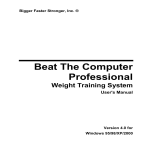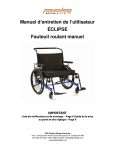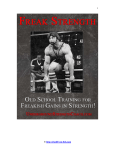Download CROSSFIT FOOTBALL - A Beginners Guide
Transcript
T I L F L A SS B O T R C FOO — A Beginners GUIDE Volume 1 Physical training can be hard and difficult. So before you embark on any physical fitness program, please consult a doctor. If you are unfamiliar with the movements in this book consult a trained professional before starting this program. This book may not be reproduced or recorded in any form without permission from the author. The information contained in this book is the sole property of Power Athlete LLC. RE T D O E F GE E T B WE TAR S Read this first...I repeat, Read this chapter first. Similar to a set of instructions from IKEA, this guide isn’t going to tell you why fifteen different types of screws (of which only two are reverse thread) and only a foil wrench are used to assemble their “sturdy” furniture. This guide provides a set of instructions on how to build a Power Athlete. This guide is an accumulation of information from athletes who have been following the CrossFit Football methodology since the early days. It’s full of tidbits and knowledge bombs that will save the reader from the occasional pitfalls encountered by athlete. Usually, these are only provided via the comments section on CFFB, but we are streamlining the process. We want our athletes to ask why we are providing these instructions. We expect our athletes to be active thinkers in order to better understand the program. The program has a simple goal: make you a stronger, quicker, and faster athlete... A POWER ATHLETE. CrossFit vs. CrossFit football Many of you may have discovered CrossFit Football via CrossFit, or perhaps while searching for information on how to get stronger while doing CrossFit. Here’s the difference: CrossFit is a training program that prepares the individual for the “unknown and unknowable.” CrossFit Football is a training program that leverages the known. When training for a sport, the requirements are very clear. Our goal is not to improve all physical attributes of fitness equally. Our intention is to improve the most vital biomarkers for ultimate success in that sport...Posture, Stability, Power, Speed, and the ability to move through space. We train the specialist. We don’t merely attempt to get football players in “shape”, or soccer players in “shape”. As the only way to get in shape for your sport, is to play your sport. CrossFit football vs. POWERATHLETE As mentioned in the previous section, CrossFit Football is a training program. POWERATHLETE is a training system. It embodies the training methodology and philosophies of its creator, John Welbourn. These methods have been forged over a lifetime of experience and research in training for performance. CrossFit Football is a free online training pro- gram published on www.crossfitfootball. com. It is merely just one interpretation of the POWERATHLETE training system. It is intended to be general strength & conditioning program for the 20,000+ different athletes of varying and unknown training backgrounds, skill levels, physical and psychological characteristics, genetics and mind sets that follow it. These are just a few things we considered when creating this training program. Things I’m hoping you already know, but I have to mention What does lifting weights and ordering coffee at “a drive thru” have in common? If you are not paying attention, you can mess yourself up. Nobody should have to tell you to NOT put a cup of scolding hot coffee between our legs while driving. We strongly urge you to seek out an experienced and credible strength coach to ensure that your movement is safe and sound. And always consult a doctor before starting any training program. This handout is not a set of rules or commandments. And just to piggyback off the first section, you are free to put your stylish Swedish furniture together however you please. But if you want it to function properly, it’s advisable to follow the instructions. And just in case you didn’t see it before, be sure to consult a physician before starting any nutritional protocols or training program to ensure that you are not at risk for injury. DISCLAIMER ON SHAMELESS ATTEMPTS OF HUMOR The context provided here is meant to be clear, concise…and entertaining. Please, do not take offense to anything written here, as it is not intended to insult; but rather to entertain. However, if we’ve already been insulted by our hot coffee reference or have a sincere love of mid century/modern Swedish furniture, please accept this apology. And we advise you to dispose of this free manual ASAP. For those brave souls who are still on board, we hope that you enjoy and find this manual informative. HE D T WO S Why is the swod the most important part of the day? We are not sure how to get you stronger withwithout lifting heavy weights. CFFB’s daily strength work is the Strength Workout Of the Day - The SWOD. If you were paying attention in the previous sections, you know the primary training affect of following this program is strength. If you are reading this with the singular secret desire of shaving a few seconds of your marathon time, then this might not ideally be the best read for you. For those seasoned coaches, one could make an argument that a stronger marathon runner will ultimately perform better.But just as there are golfers, and people that play golf, any program can work. And while any program can work, you should always ask yourself, does it illicit the best response possible? To quote Chuck Palanik, “Sticking feathers up your butt does not make you a chicken.” If you are here to get strong, quick, fast and powerful, you have come to the right place. In Tyler we trust. Respect the SWOD. I don’t care who you used to be, now you’re an amateur, and here’s how you start This program is based a multi-year approach. This is why there are three levels on training based on your level of adaptation. We have to assume your exposure to this style of training is limited. So as far as we are concerned, your training age is zero, and thus you are an amateur. Don’t be offended…be excited. Ditch your ego, follow the rules and start on the amateur template. The program is simple & repeats each week: Mon - Squat 3x5 & Press 3x5 Tue - Deadlift 1x5 aka 5RM Wed - REST Thur - Squat 3x5 & Bench Press 3x5 Fri- Power Clean 5x3 With regards to selecting the appropriate weight to start with, error on the side of too light. A weight where every rep looks perfect and you are chomping for the next workout. It’s not about where you start, but where you finish. You’re going to add weight to the bar week after week. Specifically 2.5lbs to your bench and press, 5lbs each time you Squat, and 10lbs to your deadlift. Your new best friend is the squat The Squat is the foundation of this program. Google “the king of all lifts”, and 17.5 million results will come back in .24 seconds. Those 17.5 million results will reference the Squat. We even capitalize it, just because we like it so much. So we are going to slow down, take our time and go through how we want it executed. Just to clarify, when we say Squat we mean “back squat.” If we wanted you to perform the overhead squat or front squat, we would clarify it as such. And just for reference, if we wanted you to air squat… We have found the Squat to be the best method of reinforcing and strengthen what is known as the “universal athletic position”. Plus it gets you really strong…and things get fucking serious when the weight gets heavy. CHERISH THE SQUAT. So should I high bar... Or low bar? We don’t conform to labels and descriptions are dangerous when left up to interpretation. How high is high? Exactly how low is low? We like landmarks. Remember, the goal is to get you as strong as possible while reinforcing the athletic position. With that said we want you to... ---run on sentence alert--...Squat with two full feet on sound ground at all times under your body no closer than shoulder width apart toes pointed forward (0-15 degrees) grip as close to thumbs width from the smooth as possible with your thumb around the bar and bar centered ON (not below) the base of the traps below the bone protrusion on the back of your neck. Stand the bar up off the rack with a neutral hip (hollow position) shoulders retracted and depressed. While trying to spread the world apart with your feet sit back bending knees and hips simultaneously lowering yourself in a controlled manner-your hips should NOT flick or break to initiate the movement! Depth should be just below parallel then you should stand up as fast as possible through your heels. Your second best friend is rest Very smart people (Daniel Coyle, Google him) tell us that an athlete’s ability to rest is what can differentiate the great from the champion. On a smaller scale, the SWOD is not for time unless posted as such. Regardless of what level you are on you need to rest adequately between sets. Give yourself a chance to successfully complete your lifts. Somewhere between 3 and 5 minutes. However, if you need more time, then take it. On a slightly larger scale, a rest day is a rest day. Don’t get challenged into a workout because you sister’s brother’s best friend’s cat met this guy who is doing a WOD in his garage and you don’t want him to suffer alone. Warm up sets If the SWOD calls for 3 x 5 (read as 3 sets of 5 reps) it is given you will be completing some sort of warm up sets prior to the working sets, which would be the aforementioned 3 sets of 5 reps. So how many warm up sets? You need to warm up your CNS and get you tissue moving but not so much as you shoot your load. How much volume is this? We can’t answer that for you. It’s going to depend on a few factors: how strong you are, the lift, number of reps, and sets, and to be honest, personal preference. If you don’t have enough chest hair to make your own decisions yet, you should be getting at least 5 warm up sets with an incrementally loaded bar that should be approaching your working weight. Some people are consistent with reps, some have high reps with lightweight, and reduce reps and weight increases. Find your flavor, and take control of your training destiny. Resetting on the Amateur Progression You need to pay your dues on the Amateur program and wring every gain out of it. Week after week, session after session, you’ll be adding weight to your lifts, but a tree can’t grow to the sky. If you walk in and fail a set on a lift (don’t get all the reps) then don’t add weight the next time the lift comes up. If you don’t move up and fail again, then it’s time for a reset - the next time you come in to hit the lift you failed on, reset the weight to what you hit 3 weeks prior to your last successful lift and continue the progression. Like magic, you will break through the plateau. ONLY RESET THE LIFT YOU FAILED, NOT ALL LIFTS. This approach is only optimal during a very small window. No longer than about 20 weeks. After that, we’ve driven all the adaptation from an untrained athlete and it’s time for the Collegiate template. Moving on to the COLLEGIATE SWOD If your world has come crashing down and all you are doing is resetting all your lifts, or it’s been 20 weeks, then moving onto the Collegiate template is the next step. Follow the K.I.S.S. principal. After 20 weeks your window has closed and Amateur is no longer optimal. We know this is a hard pill to swallow. We can wait until you wipe the tears from your eyes. Have no fear; you will still see gains on the Collegiate template. However; CFFB is not going to dictate when you add weight to the bar. Every time you go for a RM (Rep Max) you should go as heavy as possible. There are no boundaries. When it feels light, go for it. When it feels heavy and slow, pull on your work boots and survive the training day. But remember, each day is a battle. When it comes to getting strong or driving any adaptation, don’t rush it. The more time you spend driving your adaptation the more concrete the gains. Quick to ripen, quick to rot. WHEN AM I ready FOR THE PROFESSIONAL SWOD? We equate the “when am I ready for the Professional SWOD” question to a ZJ. If you’ve gotta ask, then you can’t afford it. (Google “Beerfest” if you have never heard this reference). The Collegiate template is multi-year template when strictly followed will continue to drive adaptation. The reps / weights / volume / tonnage is monitored on our end, and it meets the demands of our athletes. Sure, it’s a long road. But are you going to quit lifting weights tomorrow? Didn’t think so. Stick it out for 4 - 6 months and watch the gains consistently take place. Bro, it’s Saturday, where’s the swod?! There is no SWOD on Saturday. Don’t get suckered into the MORE IS BETTER I’LL REST WHEN I DIE mentality. Once again, everything is laid out so that you get the optimal dosage to increase Strength and Power. If you throw in extra strength training you may inhibit optimal adaptation. HE D O T W D SWOD, DWOD, what’s the difference? CFFB’s conditioning work takes form in a portion of the training called the DWOD. If you must know, it stands for Daily Workout Of the Day if you must know. Redundancy. Get it? Redundancy. This is our volume work... Aka accessory work ... aka conditioning... Aka metcon... Aka cardio. This really can be whatever you like. This portion of training depends on the end goals, how you feel, and how you choose to approach the DWOD. If you walk away with one thing out of this manual / handbook it’s this: There is no 80 / 20 on movement when it comes to training. You must strive to maintain posture and position. Perfect movement, regardless of how fast you want to finish your training, is the ultimate goal. The DWOD is NOT a test. It is a tool to improve conditioning; to keep you in good enough shape to regularly attack the SWOD like a fat kid would a cupcake. Do not confuse your priorities. Full body, all day, every day You don’t get to opt out of using your legs in practice, or arms in a game. There are training systems that use upper / lower splits. And there are others that have arms days or back and bi’s. Good for them. If that’s what you like, then go find those programs. We take these things into account, but we don’t train body parts. We train energy systems and movement. We will program full body, all day, every day. Deal with it. If you can’t recover from our training, give it time and keep at it. If after time and keeping at it you still can’t recover effectively to regularly complete the training as programmed, you have bigger problems, go see a doctor. WHAT’S THE DEAL WITH ACCESSORY WORK? There is merit in adding some accessory work to your training. CFFB doesn’t program it for you because they don’t know you. People tend to geek out on this stuff and dismiss the whole totally credible training system because there’s no fucking accessory work. Fine! I challenge that person to program for 20,000+ athletes and find the one size fits all “accessory protocol” to add to this program. It’s not out there. You need to be a responsible human and use the law of common sense. If you have a weak trunk and need to strengthen it, do some extra trunk work (isometric holds, back extension, abs, etc.). If your triceps are weak, do some tricep work. Throw this in after the SWOD and DWOD. But don’t make this the focal point of your training. This dwod looks way to heavy... If it’s too heavy, scale accordingly. How do you know if it’s too heavy? Remember that thing we spoke about earlier? Posture and position? They are priority 1, as we don’t know how to make you stronger without challenging posture and position by loading, and in some cases overloading the structure that is your body. CFFB DWODs are lightweight conditioning programmed for a 270lb+ professional athlete with a 600lbs squat, 700lb deadlift, 500lb bench, and 400lb power clean. It just so happens if you can handle the loads it makes for a great training stimulus to construct an extremely strong, and powerful athlete. A POWERATHLETE. But I don’t have this or that, what should I do? Option 1 - go get it. If you don’t have it go to the Google and order it. Suggested search terms: “Where can I buy a <insert equipment name here>” Option 2 - go make it. If you’re the frugal type and are willing and able, then you too can fire up the Google or the YouTube and find a DIY solution. Suggested search terms: “DIY <insert equipment name here>” Option 3 - Substitute another movement. This may take a little know how. If you opt into this scenario then you need to have an understanding of what training stimulus the original movement was trying to illicit. Or... just take a weekend off of Fireball shots and Jaeger Bombs and save some cash to buy a slam-ball. Should I kip? Or are these strict? This is a good one. Pull-ups in the SWOD should always be strict. When it comes to the DWOD, pull-ups are assumed to be kipping unless qualified as STRICT. Kipping pull ups are popular because you can do more pull ups in a shorter amount of time. That’s fine if this is in line with your training goals. However, you shouldn’t be afraid to do strict pull ups even if not qualified in the DWOD. While you may not finish the workout as fast as if you had kipped, we know that strict pull ups will strengthen the upper back. We also know that most people break in their upper back on their deadlift and Squat. What we see is people who can bang out a lot of very powerful strict pull ups tend to have better Squats and deadlifts. Decisions, Decisions... I’m a girl, and I wish my brain was as big as my butt... Help!!! Not all genders can be as gifted as the human male when it comes to thinking and reasoning. But fear not young lady it just so happens that one of you is amongst the highest of our ranks. Regarding linear progression - if the increments on a lift are too much to sustain over a 12 - 15 week period then cut them in half. Regarding the DWOD, the magic number is 66%. 66% of the prescribed weight has proven to be the approximate equivalent to illicit a similar training stimulus in women. For the kettle bell, dumbbell, or sandbag/ slam ball movements you should be able to scale above the suggested 66% figure. Do not bank on this figure though. It is an approximation. Workouts should be heavy and hard. If it’s not heavy enough, use more weight. RE A U O O T Y Y W D T O N REASTAR Your typical CFFB workout 15 - 20 minute warm up 45 - 60 minute SWOD 5 - 10 minute rest / set up / whatever 7 - 15 minute DWOD How long it takes to complete a full CFFB training day depends on a few things: Do you have training partners? How many? Do you have any equipment availability issues? How much rest do you need between sets on the SWOD to perform the best? You should take the time to adequately warm up. People who rush the warm up tend to hurt themselves and are sidelined for a week or more and compromise results. The SWOD should be completed before the DWOD. The only exception is with female athletes. We’ve observed better performance in the SWOD when completed after the DWOD. Test, retest. See what works for you. What to do if your short on time The SWOD. It takes precedence if you’re short on time. If there are two lifts programmed and one of them is Squat, and you only have time for one; then it’s time to Squat. If you can’t block out a full 90 minutes to train and need to split the SWOD and the DWOD into two training sessions, that works as well. Do you SWOD first then hit the DWOD later. Train fast be fast... And don’t skip the sprints! If CFFB programs a run in a workout, you should be running as fast as you can. For some reason people attack the runs like it’s time to recover. Total bull shit! Train fast, be fast. Train slow, be slow. Every time you run in your training, it should be as hard and fast as you can run. If the programming tells you to rest as needed, take the time to REST AS NEEDED. You should be fully recovered before starting your next attempt. Be a performance whore We are performance whores and you should be too. If you could prove to us that a cobra blood smoothie in the morning would yield a better athlete, we’d probably start breeding cobras. It’s not always about how much you can squat or bench, your “Fran” time, or even how high of a box you can jump on. It’s about how well you can perform in your sport of competition. Obviously if your sport is the Sport of Fitness, or even competitive lifting, then YES it is about that. But our comments are in regards to sports with balls; field sports. Do not strive for better numbers at the expense of compromising posture, position and quality of movement. And remember, your training isn’t the test. It’s training. The test comes on the field, the ring, the pitch, or ice. These CrossFit football guys programmed too light! If a lift is programmed lighter than usual, then it’s meant to be light. We understand that weight will dictate speed of movement. But remember, train fast be fast. If you see a Squat day programmed with relatively light weight, this should not be seen as a “light day” or “easy day” you should try the move the bar as fast as you possibly can on the concentric portion of the movement (standing up). The same goes with horizontal and vertical pressing. You should ALWAYS be moving the load as fast as physically possible during the concentric phase of the movement. Eccentric loading should always be controlled. Don’t know what concentric and eccentric mean? Google it. But we trained legs yesterday We don’t train body parts so get out of that mentality. It may be hard, but you need to do it. Your lower extremities are extremely capable of all sorts of feats of strength. We deadlift the day after we Squat. We clean the day after we Squat. It works. If it didn’t work we wouldn’t do it. 5rm vs. 5,5,5,5,5 vs 5-5-5-5-5 and other things you should know about reps You’re going to see reps written a few different ways on CFFB.com. Let’s take 5’s for example. When it says 5’s, we’re talking about sets of 5 reps. It’s always assumed you will be completing warm up sets before your working sets. Warm up sets can be in any set & rep scheme at submaximal weight leading up to your working set(s). 5RM is a 5 rep max. It means you are trying to support the maximal weight you can for 5 reps. This is 1 working set. If you can get a 6th rep then it’s not a 5RM that’s a 6 rep max. 5RM, 3 x 5 @ 90% is a 5 rep max, followed by 3 drop sets of 5 reps at 90% of the 5RM you just hit. Four working sets of 5 reps here. 5, 5, 5, 5, 5 is 5 working sets of 5 reps pyramiding up in weight. The final 5 reps should be the heaviest you can handle on that day. Your first working set doesn’t start with the bar, or 135. It starts when it gets heavy. 5-5-5-5-5 is 5 working sets of 5 reps at the same weight. In-season vs off-season You will see In-Season programming offered on CFFB.com starting the 3rd week of July or when most teams go to football training camp and will finish the last week of November. This will coincide with the football season. You should only follow In-Season programming if you are regularly participating in a sport throughout the week outside of your training. If you are not participating in sport outside of your training, then complete off-season training. Not every workout is for time Your training isn’t always the test. Competition is the test! Your training is a way for you to improve upon your limiting factors and improve biomarkers of athleticism. Not every workout has to be for time. Racing the clock is great way to maximize work output and build work capacity. But work capacity is just one component of athleticism. Maximal rep frequency and racing for time isn’t always necessary in your training; however, quality of movement is. s i s s e e s n a k e a s e i W Ad ise r ood F cu d e n A Th Here is what you should eat Eat with abandon: meat, fowl, fish, seafood, eggs, vegetables, roots, tubers, bulbs, herbs and spices as well as animal fats, olives & olive oil, avocados, and coconut (meat, oil, flour) and dairy. Dairy is a powerful tool in the strength and weight gain category. Any dairy from grassfed animals is permissible. Dairy from grainfed animals will not have an ideal omega 3 profile. Heavy cream, butter, and ghee should not be problematic. Occasional consumption of fermented dairy such as cheese and yogurt is acceptable. Experiment with milk but eliminate it if it is found to be problematic. Limit nuts, seeds, and fruit to sporadic small servings. Need a number? No more than once a week. Avoid all varieties of cereal grains (wheat, spelt, einkorn, emmer, durum, barley, rye, oats, triticale, corn / maize, sorghum, millet, fonio, and teff) soy, legumes, and vegetable / seed oils. Here is how much you should eat How much you eat controls energy levels, recovery and body weight. With this in mind we know there are really only three scenarios regarding body weight - Gain, Maintain, and Lose. To Gain - eat 20+ cals / lb of Body Weight To Maintain - eat approx 17 cals / lb of BW To Lose - eat less than 15 cals / lb of BW Consider these starting points and guidelines, not gospel. If you eat 17 cals/lb and gain weight, then eat less. You should only have to measure for a few days to get a hold on how much to eat. Rule #1: You should be eating 1g per lb of BW of protein and consuming 1oz per 2lbs of BW of h20 every day. Rule #2: You should be eating 1g per lb of BW of protein and consuming 1oz per 2lbs of BW of h20 every day. In Tyler we trust. Here is when you should eat Eat when you are hungry and eat until you are full. Don’t get overwhelmed with optimal meal placement, time of day and every other detail you can think of! The complexity typically leads to more trouble than it’s worth. Move the dirt, then worry about everything else once it keeps you from achieving your goals. Roots, tubers, and bulbs are the primary fuel source for the DWOD. Do your best to get the majority of your carbs immediately following your training. Avoid eating a shit ton of carbs at night, unless you train at night, then crush it. If you don’t attack the DWOD on a given day, or it’s a rest day, then don’t eat as many carbs. You don’t need them. Remember, you are a performance whore, and food is fuel. Earn your carbs. Here is a simple and Effective view on supplements Avoid XPLODEs, ANNHILATORs, FORMULA XP-180 BLASTS, and all the other marketing gimmicks. If you want to supplement, just keep it simple and do your research. Here’s what we see as the best bang for your buck. 3o min Pre-Workout: A 2 - 4 shot 20oz americano from Pete’s 20-40g grass fed whey from Well Food Co. 5g Leucine 5g Taurine 5g Glutamine 400mg phosphatidylserine 2g acetyl-carnatine - ALC 1000mg alpha gpc Post-Workout: Same as above, but add 30g CHO (dextrose, maltodextrin, or sucrose) Sleep-Aid before bed: 5g Bullet Proof blend from Muscle Pharm This is our recommendation. Give it a try and see if it works for you. k n i h t ou ? you y ecial SoThat sp e r A I don’t play football, I play [insert sport here] The program got its name because John Welbourn played a lifetime of football and a decade in arguably the largest arena in professional sports, the NFL. The biomarkers of performance that are improved by following CFFB are transferable to virtually all field sports. We have been told by many, that the adaptation that is driven from the program is very conducive to the demands of operators/tactical athletes. Strengthening posture and position and building an individual’s ability to display their strength efficiently and dynamically is universal to almost EVERY sport. The most successful athletes in their respective arena of battle are those who are powerful, and efficient. That is the essence of a POWERATHLETE. I want to win the CrossFit games It sounds glorious to become a CrossFit Games Champion. There are a number of training systems out there that are geared towards developing CrossFit Games athletes. They are packed full of skill work in the Olympic Lifts, gymnastic movements like muscle ups and ring dips, and tons of volume. The CFFB program is not geared towards CrossFit Games athletes who are deficient in those types of areas. CFFB will not program full lifts or muscle ups. These are not prudent components to the program’s overall goal. If Strength, Power, Size or Speed limit you from becoming a high level CrossFit Games competitor, then a few months on CFFB after your competitive season may be of benefit of you. I was always told this, and you’re telling me that Then don’t listen. We aren’t lying to you. We know CFFB has worked or thousands of athletes in various sports and of various skill levels. We’ve met them and heard their stories. Believe it or not the internet is riddled with crazy bullshit, the CFFB program and this guide do not fall under this umbrella. First, they are free. Second, this is a no frills type of program. The principles are based on tried and true philosophy. Built on the “hard,” and the “work.” If you don’t follow these pieces of advice, then don’t come to us and tell us that CFFB didn’t do what it was intended to do. I still have unanswered questions, what should I do? If it’s a “why?” question then you need to try it before you question it. Once you’ve tried it, if you still haven’t figured it out then drop us a line on POWERATHLETE Radio (Google it), or sign up for a CFFB cert. If it’s a how question, submit it to PowerAthleteHQ.com/contact-us. Thanks for reading. Good luck with your training. The POWERATHLETE Team SPECIAL THANKS AND SHOUT OUTS CFFB Nation POWERATHLETE Nation Harry Heptonstall T. Rose Shane P. Prof. Booty Denny K. Ingo B. Brewer Chops



















































